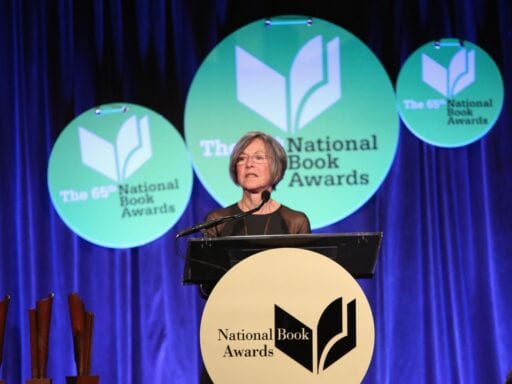Glück’s 2004 poem “October” is a salve for October 2020.
On Thursday morning, the 2020 Nobel Prize in Literature was awarded to Louise Glück, a poet whose immense simplicity of voice belies the biting irony and richness of her work.
Glück is one of America’s most celebrated poets, and the Nobel was just about the only literary award she hadn’t already won. She won the Pulitzer in 1993, won the prestigious Bollingen Prize for Poetry in 2001, and served as the US Poet Laureate from 2003 to 2004. In Thursday’s announcement, the Nobel committee noted they were awarding Glück “for her unmistakable poetic voice that with austere beauty makes individual existence universal.”
Glück has been publishing poetry since 1962, when she was just 19 years old, and she had developed her distinctive pared-down voice by 1975, when she published her second book, The House on Marshland. “The hugeness of what Glück will not say is like some big masonry wall,” wrote Dan Chiasson in the New Yorker in 2012. “What little is said shimmies through a narrow breach in the mortar.”
It’s the spareness of what Glück says, and the immense omission of everything else, that grants her poetry its intense emotional power. Often her work is animated by a sense of grievance: at the world, at her own imperfections, at the horribleness of being embodied in the world and at everyone else who dares to be embodied too. But with the poem, she is vindicated. Her closing lines sometimes seem to quiver with suppressed triumph.
In honor of Glück’s Nobel, let’s take a look at an excerpt from her book-length poem, October. It was first published in 2004, but it feels especially fresh and urgent now, in an October of a plague year whose days have gone slippery:
Is it winter again, is it cold again,
didn’t Frank just slip on the ice,
didn’t he heal, weren’t the spring seeds planteddidn’t the night end,
didn’t the melting ice
flood the narrow gutterswasn’t my body
rescued, wasn’t it safedidn’t the scar form, invisible
above the injuryterror and cold,
didn’t they just end, wasn’t the back garden
harrowed and planted—I remember how the earth felt, red and dense,
in stiff rows, weren’t the seeds planted,
didn’t vines climb the south wallI can’t hear your voice
for the wind’s cries, whistling over the bare groundI no longer care
what sound it makeswhen was I silenced, when did it first seem
pointless to describe that soundwhat it sounds like can’t change what it is—
didn’t the night end, wasn’t the earth
safe when it was planteddidn’t we plant the seeds,
weren’t we necessary to the earth,the vines, were they harvested?
Glück is writing ferociously around trauma here, around some wound in the year that has left scars and made the fact of October seem impossible. And in 2020, it’s easy to read the trauma of pandemic into the elisions of her work, into the space that has made the passage of time fall apart and sound lose sense. Because Glück has, as the Nobel committee said, made “individual existence universal.” That is her great gift.
Millions turn to Vox each month to understand what’s happening in the news, from the coronavirus crisis to a racial reckoning to what is, quite possibly, the most consequential presidential election of our lifetimes. Our mission has never been more vital than it is in this moment: to empower you through understanding. But our distinctive brand of explanatory journalism takes resources. Even when the economy and the news advertising market recovers, your support will be a critical part of sustaining our resource-intensive work. If you have already contributed, thank you. If you haven’t, please consider helping everyone make sense of an increasingly chaotic world: Contribute today from as little as $3.
Author: Constance Grady
Read More



